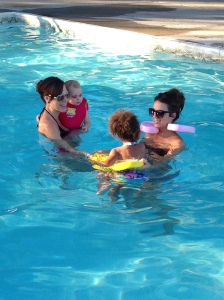News
Why You Should Make Sure Your Child Knows How to Swim
Nekdoodle understands that family and summer fun go hand-in-hand. However, it is important to
 recognize some critical safety points while enjoying summer fun with your family. Swimming can be a great aquatic experience, but it is also an experience potentially dangerous for children if they are unprepared.
recognize some critical safety points while enjoying summer fun with your family. Swimming can be a great aquatic experience, but it is also an experience potentially dangerous for children if they are unprepared.
Learning to swim can be daunting and scary for a young child, but it is important that children are able to overcome that fear in order to learn a key life-saving skill. Knowing how to swim will be an advantage in many circumstances, not just at the local pool party. It can have long term benefits for the rest of one’s life, both as a great form of exercise and a valuable tool for rescuing others.
Teaching a child to swim is an excellent way for parents to bond with children, and teach children to safely deal with fear. Parents.com (http://www.parents.com/fun/activities/outdoor/teach-your-child-to-swim/) suggests that the best time to teach a child to swim is after the child is four years of age. At that age, the child will have the appropriate developmental skills to be able to swim, as well as be able to physically handle the task of swimming.

Parents might not always consider it essential that a child learns how to swim, but consider some “what if?” scenarios. What if your child is at a friend’s house and that friend has a pool? What if that friend’s parents aren’t home, and the friend suggests the two go swimming? You may think that you have your children trained well-enough to avoid such a situation and tell their friend that they shouldn’t participate in that kind of activity, but, inevitably, there is a cautionary story every summer about children who went swimming unsupervised with tragic consequences.
What if your child just happens to fall in at a pool, or a creek, or another body of water while playing with friends, and no one knows how to swim? The natural human reaction, especially among children, in that situation is to panic. A group of children playing together might have presence of mind to get help, but meanwhile that child is still drowning in a pool. If another child is having trouble staying afloat, wouldn’t you want your child to be confident enough to help avert disaster with their swimming skills?
It is very important that all parents recognize the benefits of developing strong swimming skills at a young age for all children, because you never know when those skills will be necessary down the road. Learning to swim removes fear of the water and allows children a chance to learn a valuable life skill that can benefit that child for the rest of his or her life.
a young age for all children, because you never know when those skills will be necessary down the road. Learning to swim removes fear of the water and allows children a chance to learn a valuable life skill that can benefit that child for the rest of his or her life.
